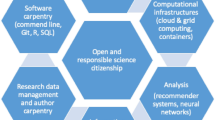Abstract
In this paper we seek to make the case for a teaching and learning strategy that integrates business ethics in the curriculum, whilst not precluding a disciplines based approach to this subject. We do this in the context of specific work experience modules at undergraduate level which are offered by Middlesex University Business School, part of a modern university based in North West London. We firstly outline our educative values and then the modules that form the basis of our research. We then identify and elaborate what we believe are the five dimensions which distinguish an integrated approach based on work experience from a disciplines-based approach, namely: process and content, internal and external, facilitation and teaching, covert and overt, and living wisdom and established wisdom. The last dimension draws on the practical relevance of the Aristotelian notion of phronesis inherent in our approach. We go on to provide two case examples of our practice to illustrate our perspective and in support of our conclusions. These are that reflection integrated into the Business Studies curriculum, using the ASKE typology of learning [Frame, 2001, Proceedings of the 9th Annual Teaching and Learning Conference (Nottingham: Nottingham Business School, Nottingham Trent University), p. 80], in respect of personal and group process in a work experience context, provides a useful heuristic for the development of moral sensibility and ethical practice.
Similar content being viewed by others
References
P. Anthony (1998) ‘Management Education: Ethics versus Morality’ in M. Parker (ed.) Ethics and Organisations (Sage, London), pp. 269–281
H. Arendt (1963) Eichman in Jerusalem: A Report on the Banality of Evil Penguin Books London
C. Argyris (1990) Overcoming Organizational Defenses: Facilitating Organizational Learning Prentice Hall Inc. New Jersey
D. Bligh H. Thomas I. McNay (1999) Understanding Higher Education: An Introduction for Parents, Staff, Employers and Students Intellect Books Exeter England
D. Boud (1981) Developing Student Autonomy in Learning, 2nd Edition Kogan Page London
P. Clarkson (1995) Change In Organizations Whurr Publishers London
D. Coulter J. R. Wiens (2002) ArticleTitle‘Educational Judgment: Linking the Actor and the Spectator’ Educational Researcher 31(4) 15–25
P. Frame (2001) ArticleTitle‘Learning from Part Time Work: the process’ in Proceedings of the 9th Annual Teaching and Learning Conference (Nottingham Business School, Nottingham Trent University, Nottingham) 80–90
P. Frame A. Dattani (2000) ArticleTitle‘What Do Students Learn from Part Time Work’ in Proceeding of the 8th Annual Teaching and Learning Conference (Nottingham Business School, Nottingham Trent University, Nottingham) 14–31
P. Frame J. O’ Connor (2002) ArticleTitle‘From the high ground of policy to the swamp of professional practice: the challenge of diversity in teaching labour studies’ Society in Transition (special edition): Labour Studies in Transition 33(2) 278–292
G. Gibbs (1989) ‘Twenty terrible reasons for lecturing’ G. Gibbs (Eds) Lecturing Programme (module 1) for the Certificate in Teaching in Higher Education by Open Learning (The Oxford Center for Staff Development Formerly Oxford Polytechnic Oxford) 12–31
C. Gilligan (1982) In A Different Voice: Psychological Theory and Women‘s Development Harvard University Press Cambridge Massachusetts
M. Hartog (2002) ArticleTitle‘Becoming a reflective practitioner: a continuing development strategy through, humanistic action research’ Business Ethics: A European Review 11(3) 233–243
R. Johnson D. Redmond (2000) Diversity Incorporated: Managing People for Success in a Diverse World Pearson Education London
D. Kolb (1984) Experiential Learning: Experience as the Source of Learning and Development Prentice Hall Inc New Jersey
J. Lave E. Wenger (1991) Situated Learning: Legitimate Peripheral Participation Cambridge University Press Cambridge
P. Lomax (1999) ‘The Significance of Action Research and Self-Study for Evidence-based Professionalism and the Development of Community’ paper presented to BERA NEI Seminar on Research Based Professionalism and Educational Action Research, University of Bath
J. Luft (1970) Group Processes: An Introduction to Group Dynamics, 2nd Edition National Press USA
B. MacFarlane (2003) ArticleTitle‘Tales from the Frontline: Examining the Potential of Critical Incident Vignettes’ Teaching Business Ethics 7 55–67
J. Marshall (2001) ‘Self-reflective Inquiry Practices’ in P. Reason and H. Bradbury (eds.) The Handbook of Action Research (Sage, London), pp. 433–439
K. McPhail (2001) ArticleTitle‘The Other Objective of Ethics Education: Re-humanising the Accounting Profession: A Study of Ethics Education in Law, Engineering, Medicine and Accountancy’ Journal of Business Ethics 34(3–4) 279–298
A. Mortiboys (2003) The Emotionally Intelligent Lecturer Staff and Educational Development Association London
E. R. Pearson Pollard R. Willison (2004) Next Choices: Career Choices Beyond University Institute for Employment Studies Brighton, UK
P. Ramsden (1985) ArticleTitle‘Student Learning Research: Retrospect and Prospect’ Higher Education Research and Development 4(1) 51–69
C. R. Rogers (1969) Freedom to Learn Merrill Columbus, Ohio
J. Rowan (2001) ‘The Humanistic Approach to Action Learning’ in P. Reason and H. Bradbury (eds.) The Handbook of Action Research (Sage, London), pp. 114–123
P. Senge A. Kleiner C. Roberts R. Ross B. J Smith (1994) The Fifth Discipline Fieldbook: Strategies and Tools for Building a Learning Organization Nicholas Brealey Publishing London
Author information
Authors and Affiliations
Corresponding author
Additional information
This article is in part based on a paper that was originally presented at the 2003 Teaching Business Ethics Conference, Institute of Business Ethics and European Business Ethics Network-UK, London and we are grateful for the constructive comments that we received then.
Rights and permissions
About this article
Cite this article
Hartog, M., Frame, P. Business Ethics in the Curriculum: Integrating Ethics through Work Experience. J Bus Ethics 54, 399–409 (2004). https://doi.org/10.1007/s10551-004-1828-7
Issue Date:
DOI: https://doi.org/10.1007/s10551-004-1828-7




